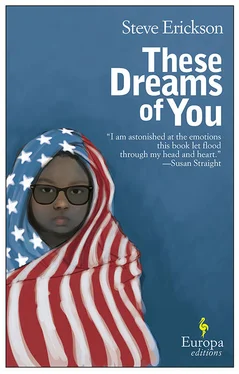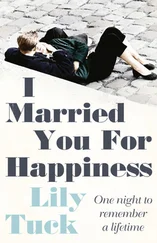She’s nobody’s daughter for a while. She doesn’t talk to any of the family. She doesn’t defy Viv and Zan or argue with Parker; the nights after the coroner comes and takes Molly away, the girl lies on the floor by Molly’s bed with her back to everyone. All her demands to be part of the family have gone silent; she makes no music. She can’t quite precisely be called inconsolable because she’s so deep in herself that she gives no evidence of anything to be consoled. Neither Viv nor Zan can get her to come to bed with them; crumpled half asleep on the floor next to where Molly died, she is not moved by any coaxing. I’m a professional, she murmurs. She sleeps there until the father picks her up and carries her to the other bed, but when they wake in the morning she’s back in her place on the floor and doesn’t give it up until the night before they’re to fly back to Los Angeles, when Parker calls to her softly, “Hey, buttmunch, come here,” and only then she picks herself up and scrambles under the blankets beside her brother.
Their last hours in London, the family continues in the hush of what’s happened, no one speaking, all domestic blasts defused, too little oxygen among them for any volume. When the kids are out of earshot, Zan tells Viv, “The bank took the house today,” and at first she doesn’t say anything. “It’s posted on the loan website.”
Finally she nods. “Today? You mean right now?”
“Well,” he shrugs, “today or yesterday. Nine hours between here and L.A., or eight hours — I’m not sure.” After a few seconds he says, “So we don’t have a home any more.”
“Well,” Viv answers, “we don’t have a house .”
One or the other of them, or both, wonder whether to go back at all. But whatever the practical possibilities of staying in London, neither takes the idea seriously enough to broach it.
Zan tries to remember if he ever really thought they would save the house. “I think I thought,” he says to Viv at Heathrow, at the gate waiting for their flight, “or hoped. . not that there would be some executive decree or anything but just that. . the atmosphere, the mood in the country, would so change that it made a difference. Now that seems really stupid.”
“No, it doesn’t,” she tries to assure him. “Really.”
“He used to be a writer once,” says Zan.
“Who?”
“The president. That should have tipped us off right there.”
There have been presidents who have written, he thinks, but that’s not the same as being a writer. That’s talent when what Zan means is temperament. This is a president who’s devoted much of his life and energy into figuring out who he is, an occupational hazard of someone with the temperament of a writer but surely not a good thing in a politician. Isn’t a politician who cares about who he really is doomed? Isn’t a politician who believes that his identity is his own rather than the public’s destined for rejection? Failed writers should be something other than presidents. Radio broadcasters, maybe. At least the ones who play music instead of talk.
The president is in trouble, Zan realizes, watching the news in the airport lobby. He thinks he’s who he thinks he is; he doesn’t understand that, in political terms, he’s who the public thinks he is or he’s no one. This was the great test, whether there was a song the country could sing in common. Instead, more than ever it’s a country of many songs all of them noisy, without a single melody that anyone cares about carrying. The country is a babel of not just melodies that no one shares but memory; and as Babel fractured language into thousands, the country is the sum total of a memory fractured into millions, not one of them a memory of the country as it actually has ever existed.
One night in Indianapolis forty-one years ago, the rest of the country detonated by the assassination of a black Georgian preacher in Memphis, Jasmine lies on the floor of the hotel room, and on the bed beside her the man who wants to be president against all his own best interests says, Who knows how the country finally will ask for forgiveness, or how that forgiveness might be given? Who knows what historic moment can represent that? The pain that can’t forget must find a way to rain forgiveness on the heart until, against our will, there grows from it the wisdom and grace of God. So tonight we pray for the fallen man and we pray for his family; but let’s say a prayer as well for the country we love.
It’s a country that does things in lurches, but when the high altitude of the great leap — of either faith or imagination, assuming one exists without the other — has given way to the next morning’s bends, the country peers around and wonders where it landed. Be that as it may, Zan can’t relinquish his memory of the melody, can’t bring himself to be unhaunted by it. There’s no other song he believes in more or nearly as much. By the din of circumstance or the roar of other voices or some combination of them, in the void no one else sings anything else as true or worth singing. Zan’s country always has belonged to the rest of the world’s imagination more than its own, and sitting here in an airport three thousand miles away, he still hears the song around him, from London to the ruins of the Berlin barricade once built in a futile attempt to keep the song out.
In the midst of Heathrow’s insane customs-free bazaar, Zan leaves Viv and the children at the gate a few minutes and retreats to the men’s room to make a phone call back to Los Angeles. “Loan number?” comes the voice on the other end of the line that Zan recognizes. “Three zero six one three nine five one nine eight,” Zan says. He’s known it by heart a long time.
“Address?” the woman says.
“1861 Relik Road.”
“Are you receiving mail at that address?”
“Yes.”
“Are you living in the residence?”
“We’ve been out of the country for a while, but it is our residence.”
“The record shows that the deed on the property has reverted to the investors who financed the original loan and that the property now is the subject of a formal trustee sale.”
“I understand. I’m calling because my family and I are returning to L.A. today and I want to arrange access scuzbag to the property.”
For a moment there’s silence on the other end and then the voice says, “I’m sorry, sir. Did you say you want to arrange access to the property?”
“Yes, please,” says Zan. “As I indicated, we’ve been out of the country for sometime now and we’re returning today, and if at all possible there are personal possessions inside the house evilbitch that we need to retrieve.”
There’s another silence on the other end and Zan imagines the woman staring at her phone, maybe trying to switch the signal on the device to a different and better reception. Finally she says, “I need to ask you to repeat that.”
“I said we’re coming back to L.A. today and I need to get into the house if I can, to get some of our personal affects.”
She says, “I don’t think that’s what you said.”
“I’m sorry?”
“That’s not what you said,” the other voice says. “Not the first time.”
“Uh, well, exactly in those words, maybe not.”
“You said something else.”
“Maybe in different words,” he agrees.
She says, “No, you said something else. Not just in different words. There were other words.”
Читать дальше











